WB, Bangladesh on track to solid partnership

A strong partnership could be developed between the World Bank and Bangladesh following the country's recent graduation to the lower middle-income bracket, the chief economist of the multilateral lender said yesterday.
The relationship that is developing with Bangladesh can now be termed partnership, Kaushik Basu said after a meeting with Finance Minister AMA Muhith at the latter's residence in Dhaka.
After decades in the low income bracket, Bangladesh graduated to the lower middle-income status in July.
"The World Bank's relationship with a low income country is very different from that with a lower middle income one -- it is like a partnership."
Bangladesh has been trying to advance the agenda of inclusive growth for the last five-six years, whereas the Washington-based lender adopted the goal under the guise of shared prosperity only three years ago, Basu said.
"I think a great amount of partnership is possible with the World Bank."
Asked about the challenges the Bangladesh economy faces, Basu said every country, whether the US or Bangladesh, has weaknesses.
He cited the country's infrastructure as one of its weak spots: it has developed a lot but much work still remains to be done.
The country will also have to raise its tax to gross domestic product ratio, which, in turn, will allow it to spend on its infrastructure development.
The WB chief economist said it is not impossible for Bangladesh to accelerate its GDP growth rate to 8 percent in the next three years if it fails to boost the investment rate.
Muhith said he has also told the WB official that raising investment is a major challenge for the country at present. There has been a good amount of investment in the public sector but not enough in the private sector, he said.
Muhith also said the chief executive of the Public Private Partnership Office informed him on Sunday that 40 foreign investors held meetings with him over the last one and a half months.
Subsequently, a good amount of foreign investment can be expected to flow into the mega projects from next fiscal year.
The government sees the WB as a partnership despite the tussle over the Padma bridge issue, Muhith said. "It [the Padma bridge saga] is no longer an issue. It had no impact on our relations. The World Bank chief economist also met with the prime minister on Sunday. She reiterated the same."
The relationship with the WB is out of harm's way, he said quoting the prime minister.
Earlier in the morning, Basu, also the senior vice-president of the WB, inaugurated a two-day international workshop on 'Macroeconomic Stability, Private Sector Development, and Economic Growth' at the Bangabandhu International Conference Centre.
The event was organised by Bangladesh Bank and the United Nations Department of Economic and Social Affairs (UNDESA).
Speaking at the event, he said the governments should harness the energy of the private sector and share the responsibility in order to help the poor and the marginalised.
Basu cited an example of the leakage that takes place when the state attempts pro-poor welfare interventions on its own, such as giving food at below the market price. The method ignores one very important element of human nature: that people want to do better for themselves, want to run a business and make a profit. He said this instinct of human beings must be leveraged.
The energy and endeavour to earn profits can be utilised by the governments to generate good where it is needed, said the WB economist. "And here, you can bring the private sector into play."
Basu is also in favour of extending a little financial support directly to the poor, by way of information technology and mobile financial services, to give them some purchasing power.
"If you give the poor the money to buy and if they go and use it for food, it is in the interest of the private traders to bring food to the poor so they can buy like everyone else."
He said different parts of this huge exercise can be delegated to the private sector. There is also a need to bring in the best professional minds to deliver on that.
Likewise, he said the private banking sector has a very important role. "But you also need the state banks. The combination of the private sector banks and state banks gives stability to an economy."
He said the crisis in the Eurozone shows that macroeconomic experiments are difficult to pull off. Europe, with its best brains, still made a mistake.
"With all such experiments in economics comes risks and you will have put in the best minds to think and analyse."
"For an economy that is developing and still has a lot of poverty, it is heartening to see the amount of professional thought that is going into the construction of policies in Bangladesh."
Citing his meeting with Prime Minister Sheikh Hasina and the top officials of Bangladesh Bank on Sunday, Basu said seeing the combination of passion and professionalism he feels very optimistic about Bangladesh.
"I am very hopeful that this is a country that will be able to steer some of these risks and dangers as well." He however said there is a lot to be done.
Hamid Rashid, chief of the Global Economic Monitoring Unit of the UNDESA, said macroeconomic stability is not about price stability or financial sector stability.
In a broader sense, it is about the stability that facilitates access to finance and directs resources to the productive sectors of the economy and that includes the private sector. "We need to have a financial sector development that is supportive of the real sector," he added.
BB Governor Atiur Rahman said the real GDP growth of Bangladesh is presently twice the rate of global output growth, and the seventh five-year plan aspires to accelerate this growth to 8 percent by 2020. Rahman said the private sector will take the lead role in bringing the additional growth.
BB Deputy Governor Md Abul Quasem and BB Chief Economist Biru Paksha Paul also spoke at the opening ceremony.
Apart from nine international participants, over 200 representatives from BB, state banks, private banks, think-tanks and educational institutions are taking part in the event.

 For all latest news, follow The Daily Star's Google News channel.
For all latest news, follow The Daily Star's Google News channel. 



Comments